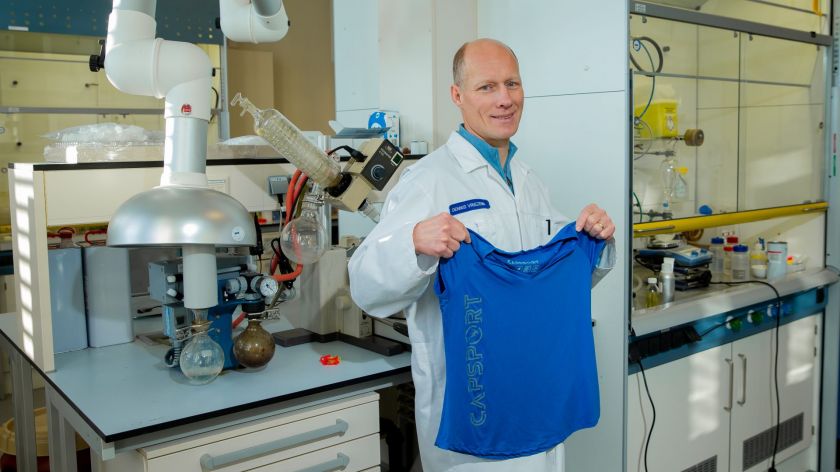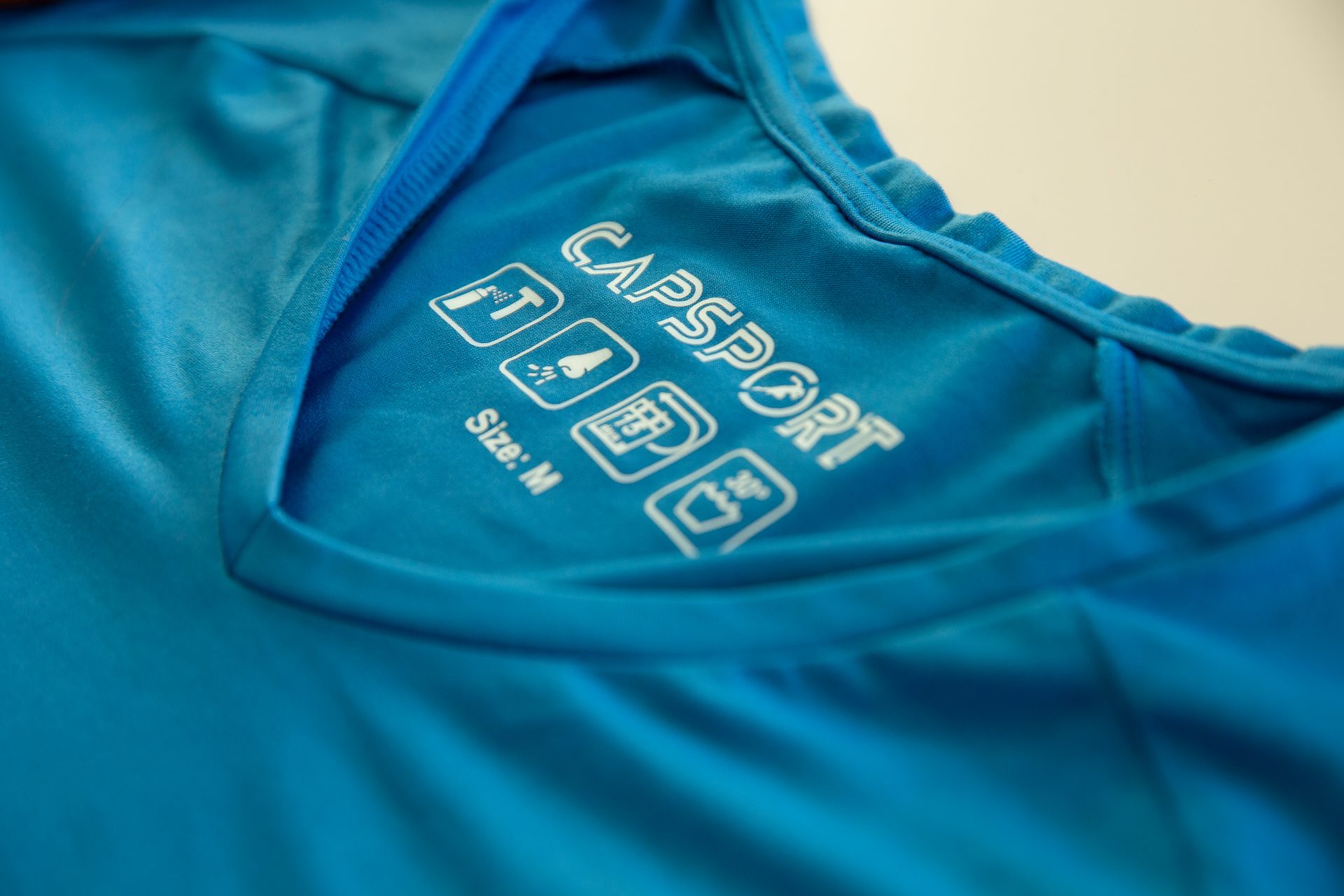Entrepreneurial chemists develop scent-retaining T-shirts
-
 Dennis Vriezema. Foto: David van Haren
Dennis Vriezema. Foto: David van Haren
T-shirts that retain the smell of deodorant, perfume, or aftershave while you work out. This new discovery by two chemists of a Radboud University spin-off is already for sale in their web shop. ‘We do research by day and ship packages by night.’
About a year ago, David Asrian and Dennis Vriezema were researching ways to make laundry detergent last longer. The two chemists work at AV Chemistry, a spin-off of Radboud University. In their lab in the Mercator III building, Dennis Vriezema explains: ‘Detergent contains enzymes that become inactive after a while, causing the scent to disappear. We discovered a way to retain the scent for longer periods of time.’
AV Chemistry’s client was more interested in the enzymes, but the chemists decided to spend their off-hours looking into the scent. ‘David and I are real gym rats, so we came up with the idea to apply our technique to sportswear’, according to Vriezema. ‘Athletes tend to sweat a lot, which gives off a very distinct odour. We wanted to develop clothing that takes care of that issue.’
Vinaigrette
The two decided to tackle the odour using so-called microcapsules: capsules so small they can only be viewed under a microscope. ‘You can compare them to storage pods’, says Vriezema. ‘The type of microcapsule we developed is very good at storing scent.’
‘We store scent in microcapsules’
Vriezema and Asrian make the microcapsules themselves; Vriezema compares it to making vinaigrette. ‘You can try to mix something oily with something watery, but you’ll never succeed completely. However, if you spin it very fast, the oil will form small droplets in the water. The same can be done using oil and plastics; when the oil forms droplets, the plastic hardens around it, creating a plastic coating. If that oil has a certain scent, that scent will be retained for longer. That is how you store scent in a microcapsule.’
Printer
The next step in the process is to get the microcapsules into T-shirts. ‘The capsules look a bit like powdered sugar. We mix that with the ink used for T-shirt prints.’

However, that proved to be easier said than done. The two chemists tried to do it themselves at first, with a screen-printing kit they bought online. ‘But we were not very good at it’, Vriezema says. That’s why they went to screen-printing company Groenewas in Nijmegen. ‘We made a few proofs to see if they could anchor the microcapsules on textiles; they did, and they even made the shirts look better (laughs).’
Hugo Boss
The two chemists have launched their own collection, titled Capsport. T-shirts can be bought in their shop for €35. At purchase the T-shirt prints will smell like detergent, which will vanish after several weeks. After that, you can add your own choice of scent to the shirts. ‘If you like Chanel 5 or Hugo Boss, you can spray some on the print’, according to Vriezema. ‘You only need one spritz, not half a bottle.’
Right now, the microcapsules are in the ink of the t-shirt print. According to the scientists the scent is stronger that sweat odours, which do still penetrate the shirt. In the long term, the chemists want to get the scent into the fibres of the shirt. ‘If we can get the microcapsules into the fibres, it shouldn’t matter where you spray. Ideally, you could spray near the armpits and have the scent stay there.’
In fact, Vriezema and Asrian want to take it a step further. ‘When you sweat, the bacteria in your armpits create chemicals that smell nasty. In the future, we want to put anti-bacterial agents in the capsules near the armpits of the shirts. That way you don’t just mask the odour but prevent it altogether. That will keep your shirt smelling fresh while you work out.’
Spray cans
According to the developers, the microcapsules also have applications outside sports. ‘With this new technique, backpackers won’t need to bring as many clothes on their trip, and it might even liven up the workplace if your clothes smell nice. Additionally, hospital patients might feel better if their linen or bedclothes have a soothing scent. However, you should make sure that whatever scent you use does not contain any allergens – you can check data banks to see which scents are safe for use. Or take my son, for example: he’s very sensitive to mosquito bites. Pyjamas with a scent that mosquitos don’t like, might lead to fewer mosquito bites.’
‘You’re not allowed to store thousands of bottles of perfume at home’
Are the two men planning to release spray cans in addition to shirts? ‘We’re still looking into it’, according to Vriezema. ‘We have found a business that can supply the required chemicals, but perfumes and the like contain alcohol, which means you’re not allowed to keep thousands of bottles in your home due to it being a fire hazard. We’re not sure yet how to deal with packaging and shipping.’
Entrepreneurial scientists
Their discovery turned the two researchers into entrepreneurs. ‘We started a separate business to sell the clothes. We do our normal job by day, and we process client orders by night, packing shirts and shipping them. If you’re starting a business, you have to do all of that by yourself.’

Business is booming, according to Vriezema, although he’d rather not disclose their actual sales figures. However, he’s in no rush to quit his day job. ‘I love doing research more than anything, because it forces you to think about new challenges every day. I didn’t get a PhD in chemistry to sell clothing.’
The entrepreneurial scientists are already involved in several collaborations. Together with the Donders Institute they want to investigate if the shirts enhance performance – if you perform better when you smell better. During the Zevenheuvelenloop, every member of Vriezema’s running club broke their personal record while wearing Capsport shirts. ‘The question is whether that’s simply a placebo effect or if we can actually prove a correlation’, according to Vriezema. We also want to investigate if patients surrounded by soothing scents are calmer going into surgery.’
Patent
Vriezema and Asrian believe they have cornered the market; they were surprised to find no other business with the same technique. There are other companies in the world doing tests on wool derived from merino sheep, which does not absorb odours. ‘But that material is quite expensive and much too warm to work out in over the summer’, Vriezema says.
‘We prefer to keep our capsule production method a secret’
Shouldn’t the researchers apply for a patent for their scent-retaining shirts? Vriezema and Asrian have given it some thought, but they will likely not pursue it. ‘Applying for a patent costs money, and it would require us to exactly describe how we make microcapsules’, Vriezema says. ‘If someone breaks our patent, you need to be able to sue them. Big names like Nike and Adidas aren’t likely to make the attempt because of the damage it would do to their image. However, large manufacturers in China wouldn’t have such qualms, and sending a dozen lawyers to deal with that is prohibitively expensive. So, we prefer to keep our capsule production method a secret.’
And if a large manufacturer wants to buy their technique? ‘We are open to discussion’, according to Vriezema.
In the laundry
Capsport shirts can be put in washing machines, but that doesn’t mean that the detergent scent will stick in the microcapsules. This has to do with their composition: greasy substances like deodorant or aftershave can get in, but watery substances like sweat or detergent cannot. While the shirts do retain their scent for longer, Dennis Vriezema still recommends washing them regularly. ‘I think that’s a lot more hygienic.’
Translation by Jasper Pesch



